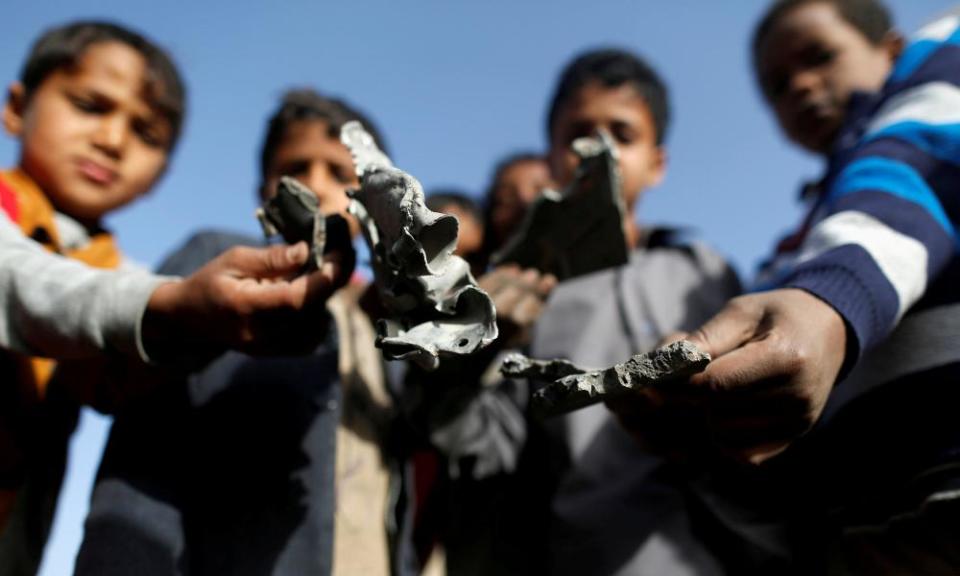No guarantee Australian weapons aren't used in Yemen conflict, government says

The Australian defence department can’t guarantee that Canberra-made remote weapons systems, that attracted a taxpayer subsidy, won’t be used in the bloody Yemen conflict.
Officials faced a grilling over military exports to Saudi Arabia on Wednesday following revelations Electro Optic Systems is exporting 500 of the systems to the Saudi interior ministry.
The ABC reported the company had received $36m in government funding.
The systems hold military cannons, machine guns and missile launchers which mount on the back of vehicles or ships, allowing weapons to be operated from inside.
The defence minister, Christopher Pyne, inspected the EOS factory in Canberra January last year at a time when the company was spruiking a $410m deal to supply remote weapons systems to an unnamed overseas customer.
At the IDEX arms fair in Abu Dhabi this week, the United Arab Emirates identified itself as the end customer. The UAE is also involved in the Yemen conflict.
During a Senate estimates hearing on Wednesday in Canberra, the Greens leader, Richard Di Natale, asked defence officials multiple times whether the weapons systems would be used in Yemen.
Department official Tom Hamilton sidestepped the questions, but said Australia always assessed the risk of weapons being used to commit human rights abuses.
“I can say categorically that our assessment process is followed for each and every permit and that includes an assessment of the overriding risk that they’ll be used in human rights abuses,” he said.
“Doesn’t help the four-year-old kid who had their leg blown off,” Di Natale responded during a testy exchange.
The assessment criteria for export permits included international obligations, national security, regional security and foreign policy, Hamilton said.
This week a British parliamentary committee report said the UK is on “the wrong side of the law” by sanctioning arms exports to Saudi Arabia and should suspend export licences.
Germany has suspended arms sales to Saudi Arabia, and Italy, Denmark and Finland, have announced plans to follow suit. The US Congress has voted to withdraw US support from involvement in Yemen.
In the wake of last year’s murder of Washington Post reporter Jamal Khashoggi, the foreign affairs minister, Marise Payne, said “all options remain on the table” including a possible Australian ban on arms sales to Saudi Arabia.
“That position hasn’t changed,” Payne said.
Asked if Australia was condoning the activities of the Saudi regime, Payne defended the government’s military export approval processes.
Human Rights Watch’s Australia director Elaine Pearson criticised Australia’s ongoing secrecy on arms sales to the Middle East.
She said if the EOS weapons systems were being used by the Saudi-led coalition in Yemen that would be in violation of the arms trade treaty.
“The Saudi-led coalition has repeatedly flouted the laws of war and thousands of civilians have been killed in unlawful strikes,” she told Guardian Australia.
“Australia has to be very careful that its military sales aren’t complicit in facilitating unlawful attacks in Yemen.”
In Riyadh with HE Ahmed Al Khatib, Chair of Saudi Arabian Military Industries talking exports and industry cooperation. #auspol 🇦🇺🇸🇦 pic.twitter.com/0omlHDN40F
— Christopher Pyne (@cpyne) October 29, 2017
EOS is not the only Australian defence company with Middle East links it has tried to keep quiet.
Perth’s Barrett Communications announced in June it had completed a $7m contract for tactical VHF radio equipment to an “unnamed Middle Eastern military force”.
The equipment included hand portable, manpack, mobile and base stations.
Barrett Communications’s chief executive officer, Andrew Burt, declined to answer questions from Guardian Australia about whether the radio gear was exported to Saudi Arabia or the UAE.
“As a private business it is our policy not to comment on questions of this nature, other than to confirm that we adhere to the strict requirements applied to us by the department of export control,” he said.
Melbourne-based Defence Vision, which manufactures gyro-stabilised camera systems for drones, vehicles and ships, has denied it is supplying its products to Saudi Arabia and the UAE.
Great to travel in @AustralianArmy Hawkei this morning to open Electro Optic Systems’ (EOS) new production facility in Canberra ➡️ https://t.co/MQxgGomKEq #auspol #ausdef pic.twitter.com/e7uRm77xrQ
— Christopher Pyne (@cpyne) January 30, 2018
In May last year, the company put out a press release stating it was “looking for distributors to tap into the Middle Eastern market” and was hoping to gain a foothold in the UAE and Saudi Arabia.
“We are doing nothing in the Middle East at the moment. We didn’t get a lot of interest from that part of the world,” the general manager, Jason Beasleigh, said on Tuesday.
“I don’t think we’ve ever done [a deal with Saudi Arabia], certainly not in my time.”
He said the parent company, Ascent Vision, formerly UAV, was at the IDEX arms fair this week.

 Yahoo News
Yahoo News 